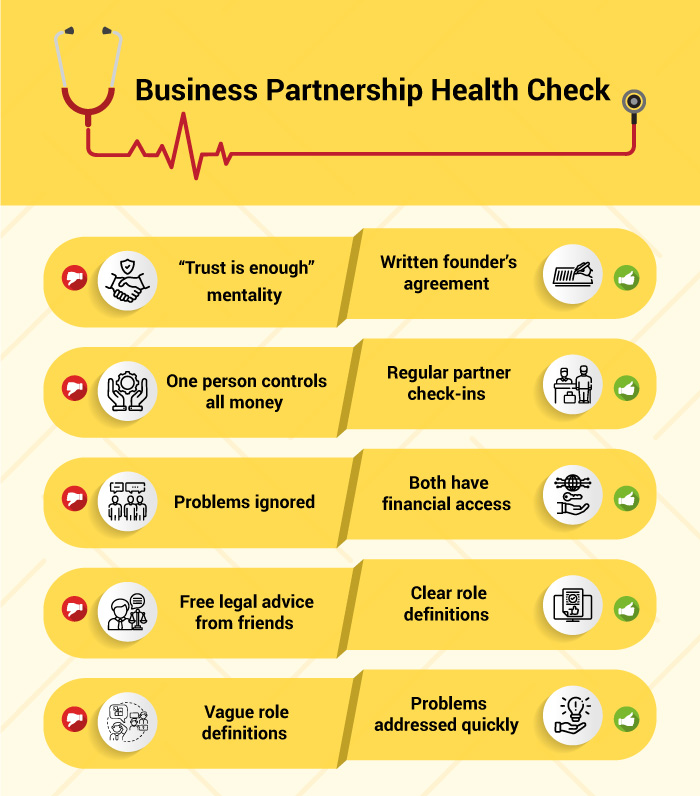So, you’ve got a big idea and someone to build it with. Sounds exciting, right? Two brains, double the energy, shared late-night snacks, and dreams of creating something amazing together. What could go wrong? Well, a lot, actually.
Business partnerships usually start with loads of excitement, big dreams, and “we’ve totally got this” vibes. But sometimes, things don’t work smoothly. Trust starts to slip, people get annoyed, and before you know it, you're stuck in awkward silences or messy arguments. One day, you’re happily designing a logo together, and the next, you’re clashing over who forgot to pay the website bill.
The thing is, most partnerships don’t fall apart because of bad business ideas. They fall apart because people miss the warning signs, skip the important stuff, or avoid the tricky conversations. But here’s the good news. These mistakes are totally avoidable. One smart move now can save you a lot of trouble later.
If you want your partnership to stay strong and actually work, stick around.
Why do most business partnerships fail?
So, we’ve all seen the highlight reels of two co-founders shaking hands, launching something cool, and smiling for press photos. But what you don’t see is what happens behind the scenes when things start falling apart.
Most partnerships don’t crash because the business idea was rubbish or the market didn’t respond. They fail because of what happens between the people running the show. The truth is, a lot of these issues are small at first. But when no one pays attention to them, they grow into full-blown chaos.
Here’s a closer look at the real reasons why so many business partnerships hit the wall:
1. Those early signs you pretend not to see
Sometimes, you notice something that doesn’t feel right. Maybe your co-founder avoids making decisions, or they disappear when there’s something serious that has come up. You feel uncomfortable, but you stay quiet because you don’t want to cause trouble.
The problem is, staying silent doesn’t make the problem go away. It just builds up inside. Over time, the small thing that annoyed you turns into a big problem. And by the time you finally talk about it, it’s much harder to fix. Partnerships don’t usually break because of one big blow-up. They fall apart because no one speaks up when it matters most.
2. Ignoring what others have already learned
There are loads of stories out there about failed partnerships. Some people write blogs, others share their mistakes on social media or in interviews. These are real lessons from people who’ve already been through the tough stuff.
But many new business owners don’t take the time to learn from these stories. They think, “That won’t happen to us. We’re different.” So they make the same mistakes others warned them about. It’s like walking into a puddle even though someone just told you it’s there. Learning from others won’t fix everything, but it can save you from a lot of trouble.
3. Trusting the wrong people to give advice
When legal matters come up, some people turn to a friend, a cousin, or that one guy who once took a business law course. Others rely on free templates or vague chats instead of proper agreements.
What ends up happening is confusion. Without a proper legal agreement, no one knows exactly who owns what, who makes the final call, or what happens if someone wants to leave.
When things go wrong, people argue. And because nothing was clearly written, those arguments get worse. A proper agreement from an honest lawyer might feel boring, but it can save you from a huge mess.
4. One person handles the money, the other stays in the dark
Money is one of the biggest reasons partnerships break. And it often starts with one person managing all the payments, while the other has no idea what’s going on.
Maybe they don’t have access to the bank account or they might have to always keep asking for updates. This kind of setup creates stress and mistrust. The person who’s not involved with the money starts to wonder what’s really happening.
When people don’t feel included, they stop feeling like equal partners. That leads to arguments, and sometimes, complete breakdowns.
5. Trust is not a business strategy
When you're starting a business with someone you like and trust, it feels natural to skip the serious stuff. You tell yourself, “We’re on the same page,” and dive right in. No contracts, no clear roles, just good vibes and big plans.
At first, things went smoothly. But as soon as pressure builds or money gets involved, that trust starts to shake. Without anything written down, it’s easy to get confused about who was meant to do what. And when expectations clash, it can lead to blame, arguments, or silence – none of which are good for business.
The truth is, trust alone isn’t enough. You need something clear to back it up. It doesn’t have to be super formal. Just sit down, talk through your roles, and put it all in writing. That way, you both know where you stand from day one. Planning is what keeps the partnership strong when things stop being easy.
How to build a partnership that works?
Alright, so now you know the common traps that make business partnerships fall apart. But what about the other side of the story? What makes a partnership actually work, not just in the early days, but in the long run too?
A strong partnership doesn’t need to be perfect. You just need to be honest, organised, and willing to do a bit of upfront work. It's like building a house. If you lay a strong foundation early, the whole thing won’t crumble the moment there’s a storm.
Here are the lessons learnt from failed co-founders and investor relationships so that you know how you and your co-founder can set things up in a way that keeps things running smoothly, even when things get messy:

1. Start with the uncomfortable conversations
Most people rush straight into logos, names, and product ideas and leave the difficult talks for "later." But if you wait until there's a problem to talk about money, workload, or who’s in charge of what, it’s already too late. So, before you start assigning email addresses or ordering business cards, sit down and have a real chat. What are your roles? Who’s handling what? What if one of you wants to leave later? What happens if you don’t agree on something important?
These chats might feel awkward at first, but they’re absolutely necessary. Think of them as insurance for your relationship. You don’t plan for things to go wrong, but if they do, you’ll be glad you had the talk. You’ll probably be surprised how much clarity this brings. Often, people have very different expectations without even realising it until it causes a clash.
2. Put everything in writing
You don’t need to be a lawyer to write things down, but getting proper legal help is a smart move. A clear agreement makes sure both partners know exactly what’s expected and what to do if things change later.
Talk through the basics:
- What does each person do?
- Who owns how much?
- How will you pay yourselves?
- How are big decisions made?
- What if someone wants to leave, or a new partner joins?
Once you’ve agreed, have a lawyer help you turn it into a proper document. You can call it a founder’s agreement or a Memorandum of Understanding (MOU). The name doesn’t matter as much as making sure it’s clear, fair, and signed. It’s one of the best ways to avoid confusion and protect the partnership as your business grows.
3. Get advice from actual experts
No offence to your cousin who once took a business law class or your friend who “knows a guy,” but starting a business is too important to rely on casual advice. Bringing in a lawyer or business advisor early might feel a bit formal, especially if you’re just getting started, but it’s money well spent. A good advisor can help you choose the right legal structure, avoid risks, and make sure your agreements actually protect you if something goes wrong.
And it’s not just about legal stuff. Someone with real business experience can also guide you through things you might not have thought about, like taxes, intellectual property, or investor terms. Getting professional help early on can save you a lot of stress and confusion later. Don’t wait for a problem to show up before you ask for support.
4. Be transparent with money from day one
Money can quickly become a tricky subject if things aren’t clear from the start. Set up a joint bank account for business funds. Use simple tools, even just a shared spreadsheet, to track income and expenses. Make sure both of you know where the money is going and who has been paid.
Avoid situations where one person handles all the finances while the other is left out. That kind of setup often leads to misunderstandings, even if no one is doing anything wrong. If you're not ready for accounting software, a basic system like weekly check-ins or monthly overviews will work just fine. The goal is to keep both partners informed and involved.
Also, have an open conversation about money expectations. Are you paying yourselves? Reinvesting profits? Taking a monthly draw? Sort it out early so there are no surprises later.
5. Check in regularly, even when things feel fine
Don’t wait for something to break before you talk. Build the habit of checking in with your partner regularly. It doesn’t need to be formal or awkward, just sit down now and then to chat about how things are going. What’s working? What feels off? What could be better?
These little conversations keep things healthy. They help you find out about small problems early, before they turn into big ones. They also show your partner that you care about the relationship, not just the business. You can do these check-ins once a week, once a month, or whenever it feels right for your setup. The important thing is to create a space where both of you can speak honestly without feeling judged or defensive.

Final thoughts
Let’s be real. Starting a business with someone feels exciting. You’ve got the energy, the ideas, and maybe even matching mugs. However, after that early excitement fades, what keeps things going is how you work together when stuff gets tricky. A great partnership isn’t built on trust alone or “we’ll figure it out later” plans. It’s built on clear talks, proper agreements, and a bit of grown-up thinking (yes, even if you still laugh at memes during meetings).










